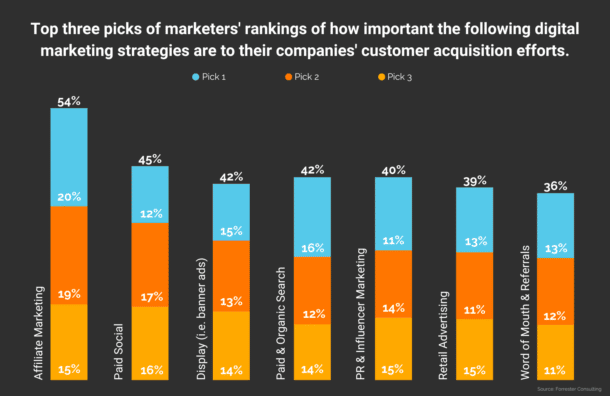Generating trial users and acquiring customers for your SaaS business can be a frustrating challenge.
If you’re looking for new ways to grow your business, you may have heard of affiliate marketing and wondered how it can help your SaaS company, read on.
In simple terms, affiliate marketing is a type of performance-based marketing in which a business rewards an affiliate for each new customer or sale that they generate. The idea is that by partnering with affiliates who have audiences that are interested in your product or service, you can reach new customers and grow your business. And because affiliate marketing is performance-based, you only pay when results are achieved, making it a cost-effective way to acquire new customers.
If you’re thinking about implementing an affiliate marketing program for your SaaS business, there are a few things you need to know. First, you’ll need to identify potential affiliates who have audiences that would be interested in your product or service. Then, you’ll need to determine what type of commission structure will work best for your business. Finally, you’ll need to put together an attractive offer that will incentivize affiliates to promote your products.
By following these steps, you can set up an effective affiliate marketing program for your SaaS business and start acquiring new customers. So if you’re ready to take your business to the next level, read on to learn everything you need to know about affiliate marketing and affiliate programs for SaaS companies.
Why Affiliate Marketing Is A Natural Fit for SaaS
Affiliate marketing is the monetization of word-of-mouth marketing.
SaaS businesses can use affiliate marketing to generate leads and customers.
Affiliate marketing is a type of performance-based marketing in which a business rewards one or more affiliates for each visitor or customer brought by the affiliate’s own marketing efforts.
SaaS companies, in particular those following the product-led growth model, are an ideal fit for affiliate marketing because they typically have high-value products or services that offer recurring revenue. This means that SaaS companies can offer affiliates a percentage of each sale, rather than just a one-time commission.
Affiliate programs are easy to set up and manage, and they provide a way to track leads and conversions. Additionally, SaaS companies can use affiliates to reach new markets and target new customers.
Generally speaking, there are two types of affiliates: influencers and publishers. Influencers are people with followings who can promote your product or service to their audience. Publishers are websites or platforms that promote products or services to their visitors.
There are many benefits of affiliate marketing for SaaS businesses, including:
- Reach new markets and target new customers
- Cost-effective lead generation
- Increased brand awareness and credibility
- Easy to track leads and conversions
Creating strong affiliate marketing programs with a high-quality affiliate network will positively contribute to your company more than you could expect, but misusing the system to make a quick buck will only minimize your reach, accountability, and reliability as a SaaS business.
Affiliate Programs and How To Use Them
An affiliate earns a commission for marketing another person or company’s products, services, etc. There are programs for affiliates to find offers to promote — these platforms are a great place to start and test the affiliate marketing waters.
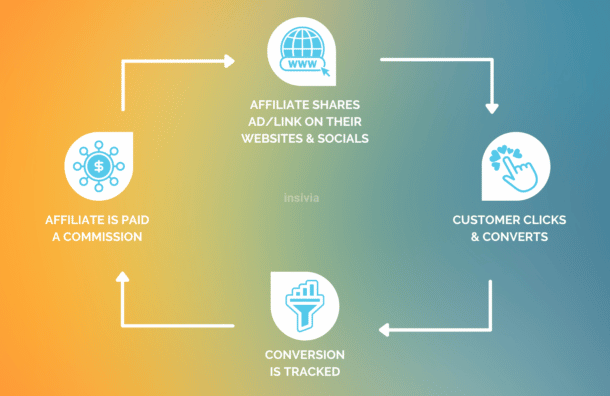
The affiliate searches for a product or service they enjoy, and promotes the product or service while earning a piece of profit from each sale they make. Then, sales are tracked via the affiliate links, sometimes known as referral links from one website to another
Types of Affiliates
There are a number of affiliate programs you can consider when looking to promote your product or service. Once you start this process, you’ll want to keep in mind how and where your audience spends their time. Are they normally on Facebook? Do they tend to use search engines to find new products? Do they read blog posts shared on LinkedIn? Etc. By narrowing these questions you can identify which broad type of affiliate to focus on: publisher or influencer.
The following are some of the most popular types of affiliate programs you can brainstorm as potential future avenues for your own marketing efforts:
Search Affiliates
The search affiliate model emphasizes freelancers or entrepreneurs to pay their own money to promote your product or service on search results and other online advertising platforms like Facebook advertising or Google Ads. Ideally, this affiliate has a background in SEO and is comfortable A/B testing to see which odds result in the most referrals for you, and intern the biggest return on investment for them. This is where major misconceptions of affiliate marketing come into play, a search affiliate is a publisher, the next section highlights influencers.
Bloggers, Podcasters, and Influencers
The common misconception is that in order to institute an exceptional affiliate marketing program, you must use influencers that fall under the generalized idea of what an influencer is: somebody with millions of followers, young, hip, etc.
But in reality, an influencer can be virtually anyone.
Mainly, somebody with the ability to influence their audience, big or small. To start, find somebody within your own network that has a similar type of network (ie. you are both in sales and marketing for a software company). As you gradually work your way up, find industry experts, people who have positioned themselves as a trustworthy figure to your ideal, niche audience. For instance, if you sell software for biotech companies, find a highly trusted person who could even be the target customer for your potential future clients through social media posts.
This can result in your target audience visiting your website. Influencer marketing grew to $13.5 billion in 2021, and businesses are making $5.78 ROI for every $1 spent on influencer marketing.
Affiliate marketing is not a guarantee for conversion but it is a guarantee for visibility , the first, and arguably most important, step of your SaaS sales funnel.
Review Sites
If you offer a product or a service that is niche, it’s very likely that your target customers need to and actively conduct research on the topic and the options before converting. If that’s the case, spend time researching top review sites related to your product and service. Reach out to the writer, the marketing team, whomever you can find and offer to provide an affiliate link to your product or service in the text.
Email Marketing
Email marketing is best served short, simple, sweet. You don’t want partners sending out bulk emails to customers who inevitably are not within your target and likely are uninterested in your products or services. However, with high-level research and consideration for who is receiving the email, this strategy could lead to higher conversion and ultimately retention rates.
For example, if you sell design software, you might partner with advertising or marketing agencies and ask them to include a link to your product within emails they send to future design clients. This will help their clients leverage your tools to create higher quality content while giving that agency an added source of income.
What is the difference between affiliate and influencer marketing?
The difference between influencer marketing and affiliate marketing is like a rectangle and a square. Influencer marketing is a tactic of affiliate marketing. It just so happens to be one of the most common and successful ways to implement some type of affiliate marketing program into your business.
5 Inspiration Examples of Effective Affiliate Programs in Tech:
HubSpot
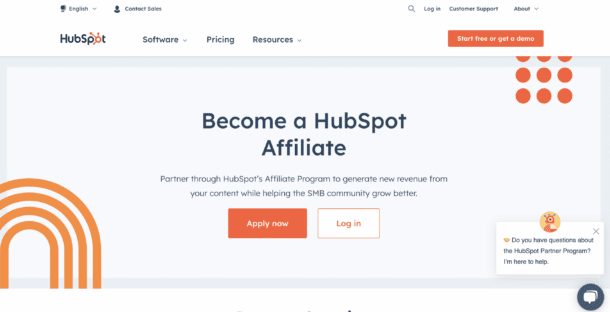
Leading CRM platform that connects everything scaling companies need to deliver a best-in-class customer experience in one place.
- 15% recurring rate commission (100% w/in first month)
- $276 average payout
- 90-day cookie lifespan
Elementor

Website builder for professionals on WordPress.
- 50% commission
- Custom rates
- 90-day cookie lifespan
Stripo
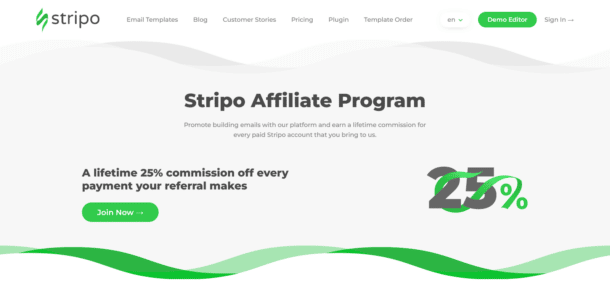
Email design platform that helps create responsive email templates without the need for high-level coding skills.
- 25% recurring commission for referrals
- Affiliates earn appx $1,500 per month
- 120-day cookie lifespan
SEMrush

SEMrush is a leader in all-in-one SEO, PPC, social media advertising, and competitor intelligence.
- 40% recurring commission for referrals
- Affiliates earn appx $2,8050 per month
- 10-year cookie lifespan
Leadpages

Leadpages is a lead generation tool that enables customers to set up basic necessities for online communications.
- 50% recurring commission for referrals
- Affiliates earn appx. $50 – $3,000+ per month
- 365-day cookie lifespan
Types of Affiliate Marketing
In addition to affiliate programs, there are also particular affiliate marketing tactics. In order to create an effective program for your SaaS business, it’s vital to understand the types of affiliate marketing and how they impact different people and different businesses.
Where to Find Appropriate Affiliates to Promote Your SaaS
As a SaaS business, you’re probably serving an industry that has many other distributors, agents, and resellers that are targeting the same buyer personas and ICPs. Typically those businesses that are closely aligned with your focus are ideal affiliates and can naturally offer complementary value to your audience.
Related Affiliate Marketing
A partner within related affiliate marketing has an audience. Whether it’s through active blogging, a social channel like YouTube, TikTok, Instagram, LinkedIn, these people have influence. A related affiliate marketer has stake in an audience that trust them, making recommending products seamless…even if their audience has never used them before.
While related affiliate marketing can generate more affiliate income, making it a desired path for your SaaS business, it comes with risk from the affiliate marketer themselves. Because this type of marketing does not require the marketer to use the product before, therefore not knowing if they actually hate it (no offense, but it can happen) , they could lose the trust of their audience. Therefore potentially hindering their career. this means that it is hard to build a a sustainable or consistent program.
Involved Affiliate Marketing
Involved affiliate marketing refers to only recommending products that the affiliate marketer has used and believes in. It is rooted in trust and authenticity, which is the best for affiliate partners and for your SaaS business’ success. Rather than blind confidence, this marketing is confident and excited to share your product or service. Again, the partner uses their influence to promote your product or service that their followers and audience may actually need or want.
As a potential customer, this is what I, your author, want to see, and it’s what I recommend you follow through with. Instead of paying to get clicks on some banner advertisement, your business will build a more enthusiastic audience. Additionally, though, it does take more time to build credibility with that audience, but it is necessary for maintaining a sustainable program.
However, the SaaS industry has overlooked the power of affiliate marketing and therefore influencer marketing. Making this the perfect time for your business to leverage this tactic in your industry.
Potential customers can be very easily influenced if you have the right and trusted partner working alongside your SaaS business.
The reality is, 84% of publishers are turning to affiliate marketing to get new opportunities for driving revenue to their sites and differentiated contact as well. Why wouldn’t your SaaS business take this opportunity by the reigns?
Spending in the US alone for affiliate marketing reached $4.8 billion in 2016 and hit over 8 billion in 2022.
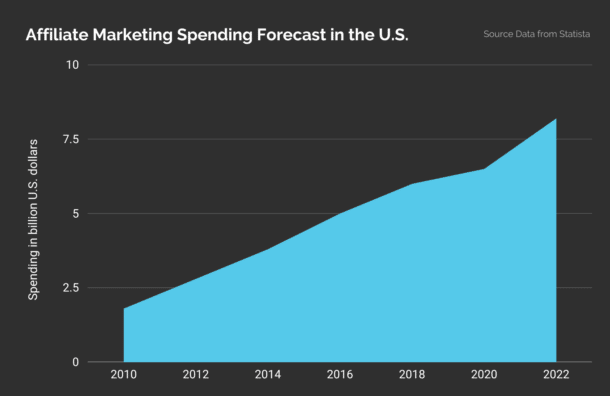
8 Reasons Your SaaS Business Should Build an Affiliate Marketing Network
Affiliate networks mean big revenue growth for SaaS companies, so it is a no brainer to start one. Here are all the reasons it should be at the top of your strategic plan.
Connects You to a Highly Targeted Audience
SaaS affiliates with a trusted audience are constantly seeking opportunities to monetize their viewership. Choosing high-quality, relevant affiliates who relate to your business or are industry experts will bring targeted traffic to your site. Not to mention, utilizing new channels can be a major cost for your company, but affiliates can promote your service, software, or product by connecting with leads through their podcasts, blogs, forums, social accounts, groups, or other channels; name recognition goes a long way.
Generate More Leads and Sales
Setting up an affiliate program is a great way to grow your marketing efforts quickly. Because affiliate marketing is a commission-based model, it’s in the best interest of the partners that you work with to generate as many leads and sales as possible. The diversification of your audience through affiliate marketing will maximize your reach and get customers through a myriad of channels you might not be actively targeting with your own marketing efforts.
Costs Close to Nothing
Low-cost marketing strategy? Sign me up…
You don’t need to invest your own funds into advertising your products, your affiliates essentially take care of that for you. And you only pay for successful conversions. The main upfront cost of setting up an affiliate program starts at less than $100 per year.
Enhances Existing Marketing Efforts
An affiliate program is not a standalone marketing method, but it can be used to improve your already existing, and potentially traditional, campaigns. Setting up an affiliate program can also help boost your website or services SEO as it can increase your domain authority.
Improves ROI and Reduces CAC
Because running an affiliate marketing program does not require large upfront investments and you just financially contribute to conversions you choose and take, they can improve your return on investment (ROI). While instituting an affiliate program can increase your ROI, it can simultaneously decrease your customer acquisition cost (CAC) because your affiliate network is contributing to that legwork.
Increases Brand Awareness and Visibility
It is vital that you are consistently building a good reputation for your SaaS business. There are almost 600,000 tech companies in the United States, making it really difficult for new businesses to accelerate quickly and distinguish themselves from the competition.
However, having a myriad of affiliates talking about your product or service on a wide range of platforms will help build brand awareness and improve visibility for your business. Additionally, utilizing the influence of affiliate marketers, you are able to provide social proof that your business is reliable and reputable.
Fosters Low Risk / High Reward
Because it is so easy to set up an affiliate program, the legwork ultimately comes from identifying ideal programs to enlist your business in. This is a process that should be done with performance data analysis, trend monitoring, and identifying audiences you wish to target. Once you have your strategy narrowed, it’s a matter of interpreting which influencers or bloggers to target, review sites to find stake on, etc. It’s also incredibly easy to scale; there is no new need to hire more sales reps or marketing strategists to keep up with demand. Instead, your business can create an excellent program, add more high-quality affiliates, and watch the results roll in.
Free Trial Users
Content creators and marketers more often gravitate to a SaaS product or software that has a free trial. If your business offers a free trial, your product will be more attractive to both marketers and their audiences because website visitors driven by affiliates are more likely to join your network or sign-up if they can test your service, product, or software for free first.
Example of Affiliate Marketing in SaaS
Better Help is accessible therapy online. You subscribe to the service and get connected with professional therapists. Using influencers on TikTok, YouTube and various podcasts to increase visibility, Better Help has no position on the size of the influencer, and neither should you. Micro-influencers are just as effective.
How to Choose an Affiliate Tracking Software
The platform that you utilize for your affiliate program is critical to achieving your goals.
In-House vs. 3rd Party Affiliate Network
Choosing the right affiliate tracking software is a crucial step in the success of an affiliate program. While in-house programs typically require in-depth technical expertise in order to implement and maintain the system effectively, they also offer more control over your affiliate program, management, and payments to your affiliates.
On the other hand, utilizing a third-party affiliate network can mean access to a more robust system and the potential for increased scalability and flexibility, and a more hands-off approach since the network will payout monthly commissions to affiliates, deal with refunds and chargebacks, etc.
Additionally, third-party networks often come with added benefits such as access to a pool of active affiliates who can potentially find promote your offer via the network’s affiliate marketplace. Often affiliate networks offer additional features like fraud detection tools or automated tracking capabilities, as well.
Ultimately, selecting a good affiliate tracking software depends on the type of program you’re running, as well as your budget and available resources. As long as one takes time to evaluate each option in detail before making their decision, they can be sure to choose a system that will help bring maximum success to their affiliate program.
Features To Look For
Regardless of the approach, there are some features and functionalities to consider that the best affiliate tracking software solutions offer, including the following:
Deep-linking
This is the ability to create a custom affiliate link to any page on the website, not just the homepage.
Why :In order to keep potential future customers locked in, you need to remember where their trust lies. It is not with you or your SaaS business quite yet–their trust is still in the affiliate; don’t give opportunity for these site newcomers to retreat out of fear you just want their money or subscription. Utilizing deep-linking gives these visitors a reason to believe in the partnership.
Cookieless tracking
Cookieless tracking uses scripts instead of cookies to monitor site visits and has displayed increased importance due to an incline in browsers utilizing tracking protection
Why : Engagement data is imperative to understanding potential customer buy-ins. Cookies are so often blocked now, and that’s fine. For a SaaS business, it can form a major deficit for data collection. Your SaaS business is reliant on data from cookies but using third-party cookies will soon be history as the depreciation of support increases across all browsers by the end of 2023. Make sure you have back-up plans for tracking customer journeys and customer retention rates.
Postback tracking
This is a method of tracking that does not rely on pixel tracking but instead stores user data directly to your server.
Why : Read above! Data matters; don’t let it slip through the cracks.
API
APIs are Application Program Interfaces and allow for various platforms to work together, oftentimes by some type of shared data.
Why : Utilizing APIs streamlines the process for both merchants (you) and affiliate networks.
Product feed
Product feeds list the merchant’s products and important, key data about each (most important in e-commerce).
Why :Access to this data gives your SaaS business’s teams to effectively promote your products, services, or softwares to your audience and specifically to the target audience your partner network gives you a front row seat to.
A great example of a useful tracking tool is Tapfiliate
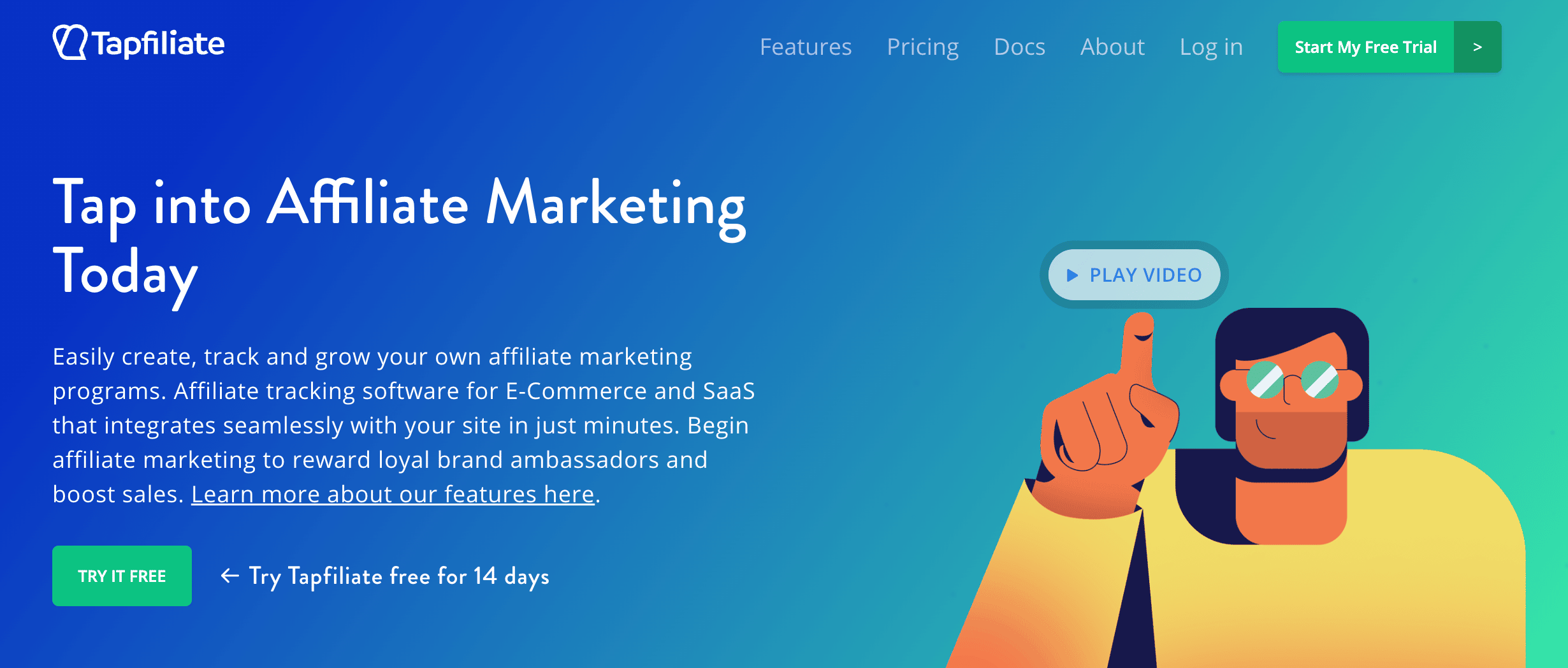
How To Ensure Your Affiliate Program Succeeds
Not all affiliate programs are created equal. But how do you make sure your affiliate program succeeds? Here are a few tips:
First, equip your affiliates with the right tools and resources. This includes an affiliate resource center, different offers and pricing for affiliates, and the ability to deep-link to different pages on your site and blog posts. By giving them the resources they need, you give them a better chance of success.
Successful affiliate programs often provide resources such as swipe (or sample) copy and graphics for social media posts, search and display ads, as well as for email marketing. Top affiliates will do more than just copy and paste these resources, but simply providing examples can make it much easier for them to take action.
Second, make it easy for affiliates to join and promote your program. The easier you make it, the more likely they are to sign up and start promoting. Think of this process as similar to that of successful onboarding, engagement, and nurturing of your customers.
Third, keep your affiliates happy. This means providing prompt payments, high commissions, and consistent communication. By keeping them happy, they’ll be more likely to promote your program and stay with it for the long haul.
Fourth, track your results and continually optimize your program. Use data to improve your program and make it more successful. Try different things and see what works best. Then, keep doing those things.
By following these tips, you can ensure that your affiliate program is successful and that it contributes to your overall business goals.
Written by: Tony Zayas, Chief Revenue Officer
In my role as Chief Revenue Officer at Insivia, I am at the forefront of driving transformation and results for SaaS and technology companies. I lead strategic marketing and business development initiatives, helping businesses overcome plateaus and achieve significant growth. My journey has led me to collaborate with leading businesses and apply my knowledge to revolutionize industries.
